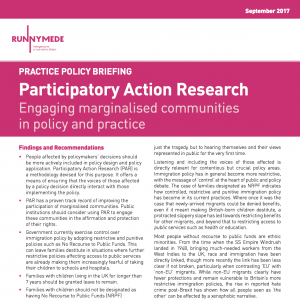You are here
- Home
- Practice Policy Briefing: Engaging marginalised communities in policy and practice
Practice Policy Briefing: Engaging marginalised communities in policy and practice
Dr Umut Erel and Erene Kaptani, The Open University; Maggie O’Neill, University of York; Tracey Reynolds, University of Greenwich
December 2017

This briefing explains the use of Participatory Action Research (PAR) with marginalised groups of people. In essence these were people who experience barriers in interacting with representatives of social policy and practice on a daily basis.
Listening and including the voices of those affected is directly relevant for contentious but crucial policy areas. Immigration policy has in general become more restrictive, with the message of ‘control’ at the heart of public and policy debate. The case of families designated as NRPF indicates how controlled, restrictive and punitive immigration policy has become in its current practices. Where once it was the case that newly-arrived migrants could be denied benefits, even if it meant making British-born children destitute, a protracted slippery slope has led towards restricting benefits for other migrants, and beyond that to restricting access to public services such as health or education.
This briefing report draws from the ‘Participatory Arts and Social Action Research (PASAR)’ project. This is a two-year research project, funded by the Economic and Social Research Council/ National Centre for Research Methods, led by: Dr Umut Erel and Erene Kaptani, The Open University; Maggie O’Neill, University of York; Tracey Reynolds, University of Greenwich (2016-2017 https://www.ncrm.ac.uk/research/PASAR/).
Published by Runnymede Trust.
Contact us
To find out more about our work, or to discuss a potential project, please contact:
International Development Research Office
Faculty of Arts and Social Sciences
The Open University
Walton Hall
Milton Keynes
MK7 6AA
United Kingdom
T: +44 (0)1908 858502
E: international-development-research@open.ac.uk
.jpg)